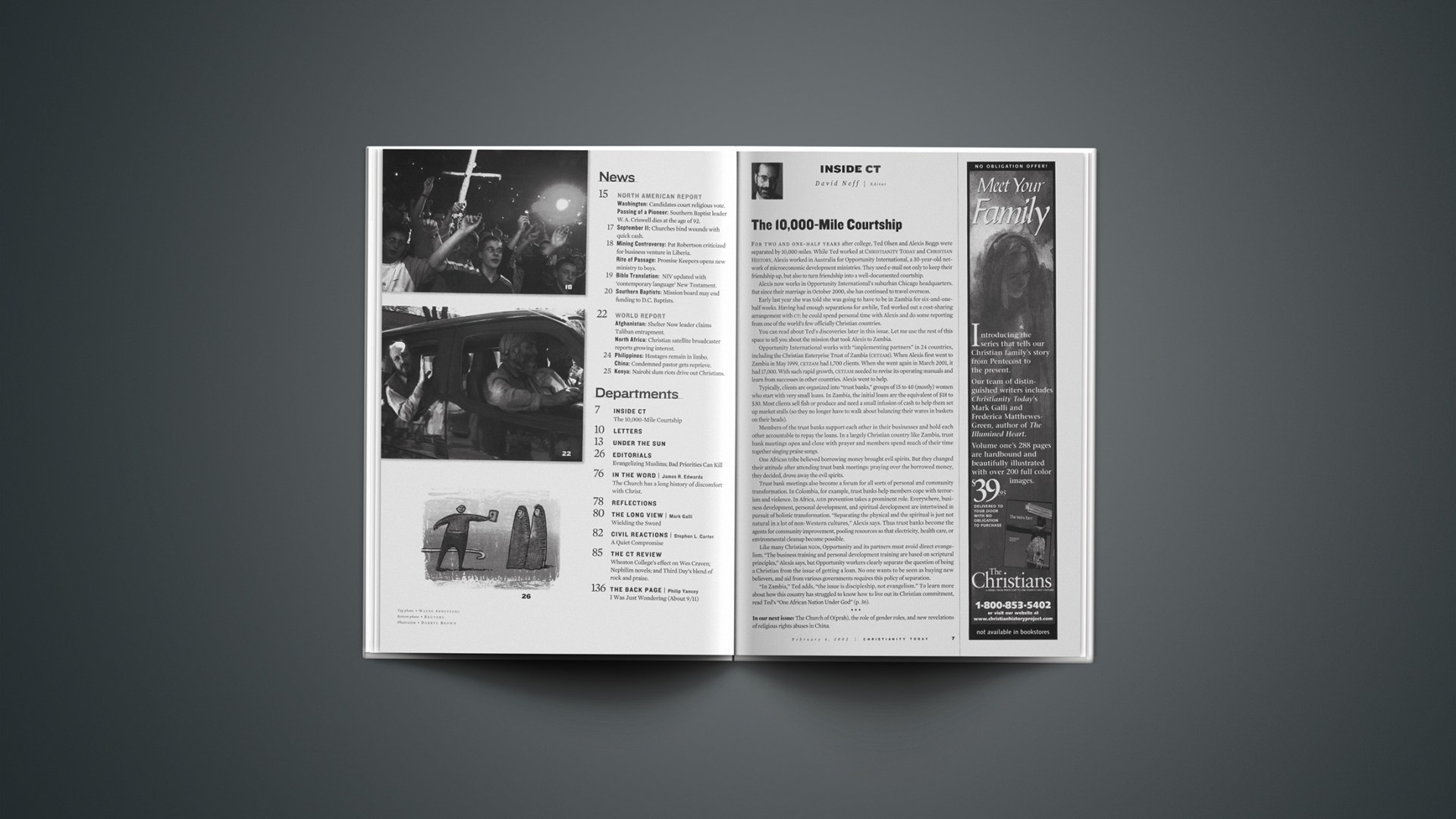For two and one-half years after college, Ted Olsen and Alexis Beggs were separated by 10,000 miles. While Ted worked at Christianity Today and Christian History, Alexis worked in Australia for Opportunity International, a 30-year-old network of microeconomic development ministries. They used e-mail not only to keep their friendship up, but also to turn friendship into a well-documented courtship.
Alexis now works in Opportunity International’s suburban Chicago headquarters. But since their marriage in October 2000, she has continued to travel overseas.
Early last year she was told she was going to have to be in Zambia for six-and-one-half weeks. Having had enough separations for awhile, Ted worked out a cost-sharing arrangement with CT: he could spend personal time with Alexis and do some reporting from one of the world’s few officially Christian countries.
You can read about Ted’s discoveries later in this issue. Let me use the rest of this space to tell you about the mission that took Alexis to Zambia.
Opportunity International works with “implementing partners” in 24 countries, including the Christian Enterprise Trust of Zambia (CETZAM). When Alexis first went to Zambia in May 1999, CETZAM had 1,700 clients. When she went again in March 2001, it had 17,000. With such rapid growth, CETZAM needed to revise its operating manuals and learn from successes in other countries. Alexis went to help.
Typically, clients are organized into “trust banks,” groups of 15 to 40 (mostly) women who start with very small loans. In Zambia, the initial loans are the equivalent of $18 to $30. Most clients sell fish or produce and need a small infusion of cash to help them set up market stalls (so they no longer have to walk about balancing their wares in baskets on their heads).
Members of the trust banks support each other in their businesses and hold each other accountable to repay the loans. In a largely Christian country like Zambia, trust bank meetings open and close with prayer and members spend much of their time together singing praise songs.
One African tribe believed borrowing money brought evil spirits. But they changed their attitude after attending trust bank meetings: praying over the borrowed money, they decided, drove away the evil spirits.
Trust bank meetings also become a forum for all sorts of personal and community transformation. In Colombia, for example, trust banks help members cope with terrorism and violence. In Africa, AIDS prevention takes a prominent role. Everywhere, business development, personal development, and spiritual development are intertwined in pursuit of holistic transformation. “Separating the physical and the spiritual is just not natural in a lot of non-Western cultures,” Alexis says. Thus trust banks become the agents for community improvement, pooling resources so that electricity, health care, or environmental cleanup become possible.
Like many Christian NGOS, Opportunity and its partners must avoid direct evangelism. “The business training and personal development training are based on scriptural principles,” Alexis says, but Opportunity workers clearly separate the question of being a Christian from the issue of getting a loan. No one wants to be seen as buying new believers, and aid from various governments requires this policy of separation.
“In Zambia,” Ted adds, “the issue is discipleship, not evangelism.” To learn more about how this country has struggled to know how to live out its Christian commitment, read Ted’s “One African Nation Under God”
Related Elsewhere:
Also appearing on our site today:
One African Nation Under God | Zambia is missionary David Livingstone’s greatest legacy. But this Christian nation isn’t always heaven on earth.
Ted Olsen’s Weblog is published every weekday on our site.
The official Web site of Opportunity International includes information on the group’s vision and values and how its operations work.
While in Africa, Alexis Beggs Olsen wrote “An Immensely Rich Cosmos | Three reports from Africa” for Christianity Today sister publication Books & Culture.
Copyright © 2002 Christianity Today. Click for reprint information.










